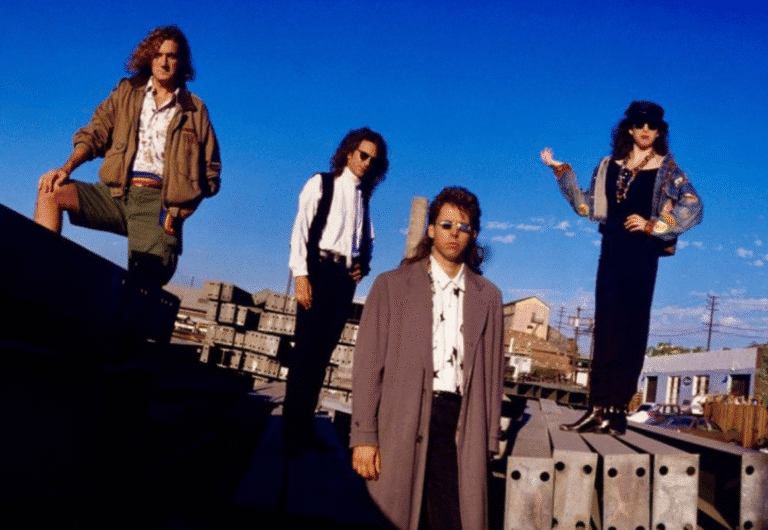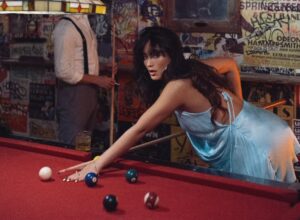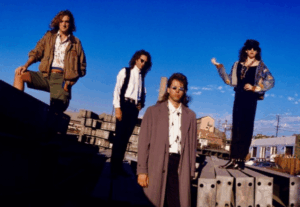Few songwriters can claim as rich and varied a career as Frank Musker. From penning hits for legends such as Queen, Sheena Easton, and Air Supply, to shaping the sound of entire eras, his work has long resonated on the world stage. But for Musker, the story didn’t end with chart-topping singles. Alongside longtime collaborators Elizabeth Lamers, Marty Walsh, Tommy Vicari, and Jeff Hull, he helped form World Goes Round—a project born in the creative hotbed of 1980s Laurel Canyon. Originally recorded and then shelved, the group’s songs have found new life decades later, carrying themes of climate change, homelessness, love, and human resilience that feel more urgent than ever. In this exclusive Music Crowns interview, Frank Musker reflects on the band’s beginnings, the rediscovery of their long-lost album, and how the timeless messages of World Goes Round connect with a whole new generation of listeners.
Frank, you’ve had a long and varied career writing for many prominent artists (from Sheena Easton to Air Supply to Queen). What inspired you to launch World Goes Round as a band / project, and how does this differ from your previous songwriting and composing work?
We came together as a band quite organically. All four of us had solid careers in LA at that time and I had a studio at my house in mythical laurel Canyon where all four of us worked in different pairings as writers, producers, session singers and studio musicians. The songwriting scene was very competitive as you can imagine and we were each doing well individually getting songs cut by various top artists but we yearned for the chance to do something more adventurous musically and thematically. Most of all we wanted creative autonomy – to be our own A and R people and to avoid the formulaic ‘by committee’ decision making by the record companies which was the norm for ‘back room’ songwriters and musicians. We were already great friends and fans of each other’s music so it seemed the natural thing to do, given that we had a vibey studio at our disposal.
The World Goes Round album was originally written back in the 1980s and has since been dug up, polished, and finally shared with the world. When revisiting those songs, how did you approach the songwriting, arrangement, and production — especially compared to writing for other artists at the time?
Thirty odd years after the tracks were shelved and forgotten about Marty discovered an analog cassette tape of a couple of the songs and sent it to me with a note saying ‘check these out’. I was blown away by how fresh and timely they sounded – Tommy Vicari’s amazing sound clarity and depth came shining through – and the songs which might have seemed out of place in 1989 seemed suddenly to have acquired huge relevance to what was happening in the world. And then lock down happened and suddenly we all had the one thing we always lacked – time on our hands. There followed a mad scramble to find the original multi tracks (some of which were never found) and Viper Records, the independent NY hip hop label wanted a whole album so we set about finding other unfinished tracks from that time. The upside of covid for us was that we finally got to lovingly finish our long forgotten album and to see through the project we had started so many years ago. In spite of the thirty year hiatus in recording the end result was seemless and if anything had benefitted from our life experience and the things we’d learned in the intervening years. Tommy’s production and Jeff Hull’s brilliant arrangements were spot on, Marty Walsh’s guitar playing was as sharp and unique as ever and we used all the original vocals which Elizabeth and I recorded back in the day. A whole new generation of listeners came to the album as new music unconcerned that it had its genesis in a different world and time. It was music for now?
Could you tell us about the key themes or messages in your most recent album with World Goes Round? What do you most hope listeners take away from it emotionally or intellectually?
We wanted to make an album of songs which spoke of the world we were living in. Big House is about the climate crisis which few people wanted to hear about in 1989 – now it’s the number one issue confronting humanity. This generation views it not as an academic possibility but as an impending reality regarding our very survival as a species. Please Please speaks of the problem of homelessness – again not a hugely popular subject back then but utterly relevant now. Put It On The Line acquired a whole new meaning during the pandemic which none of us could have foreseen when we wrote it. Funny how things work out. Sometimes as a writer you have to be humble enough to admit that you’re just the channel through which the music flows. For all this I don’t want to give the impression that we are a bunch of nihilistic doom mongers! We all are very positive people (still!) who believe that kindness, universal love and unity are the essential elements we must seek if we are to survive. The songs feel more urgent now than they did when we wrote them thanks to a new generation of listeners. That is very gratifying.
Who are the core collaborators in World Goes Round (musicians, producers, etc.), and how do you choose who you work with? Is there someone on the album whose contribution you feel especially proud of?
The key members of WGR are Elizabeth Lamers, our sensational co-lead singer, Marty Walsh, guitarist extraordinaire and rock god, Tommy Vicari, our producer and sound genius who makes everything sound so good, Jeff Hull, our most versatile member who plays keyboards, drums and bass and me. I sing and play guitar. We all contribute to the songwriting. Lately we are moving away from being self contained towards the Steely Dan concept of using back up from incredible studio musicians like Michael Ruff on piano and the legendary John Robinson on drums. I’m proud of everyone’s contribution to our album – it’s the combination of personalities which makes it unique – but we would all agree that Jeff’s musical contribution is outstanding.
You recently picked up an award (congratulations!). What was the award for, what does it mean to you personally, and how does it affect the way you see your current work with World Goes Round?
The award which I received in Rome, Italy is very special to me. It was from a foundation called AILA which was founded by Italy’s top orthopaedic surgeon, Prof Francesco Bove. It was in recognition of the work I’ve done through music over the years to highlight the role of women in our society. It was an amazing event which took place at the Colosseum and after the prize giving there was a fantastic concert with full band – strings, horns, choir etc where Elizabeth and I joined the Prof on stage to perform. Truly memorable and a great honour. As for what it means for WGR it certainly raised our profile in Italy and gave our music new impetus there. The Italian audience is very musically discerning and loyal so it was a big compliment to be recognised there.
Looking back to landmark songs you wrote in past decades (e.g. “Too Much Love Will Kill You”, etc.), how do you feel those songs sit alongside the work you’re doing now with World Goes Round? Do they still influence you, or have you moved on in unexpected directions?
Well interestingly we have finally recorded our own version of TMLWKY and people are loving it so it could be our next single. We figured that after all this time it would be cool to let the world hear a WGR version of this song which has become such a classic over the years by Freddie Mercury and Brian May. It’s quite live sounding with beautiful contributions from Michael Ruff on piano and JR on drums. Stay tuned for later in the year.
Where do you see your core audience for World Goes Round? Are you aiming to reach your earlier fans, a new generation, or both? How do you hope your album will resonate across different groups?
The album seems to have found a keen audience among the new generation which is especially satisfying since it shows the enduring appeal of our music. Good songs last forever and we’re so pleased that ours have stood the test of time.
After this album and the recent recognition, what are your plans for the future? Tours, further recordings, collaborations, exploring new genres? And are there any dreams you still hope to fulfil that you haven’t yet?
We are working on new material for the next record which will show the evolution of our sound and we can’t wait to get it out there. Our dream is to be able to play in front of audiences all over the world and to bring our positive message to everyone in every country. After all the name of the band says it all. We always conceived of our music as universal and slowly but surely its becoming a reality.







